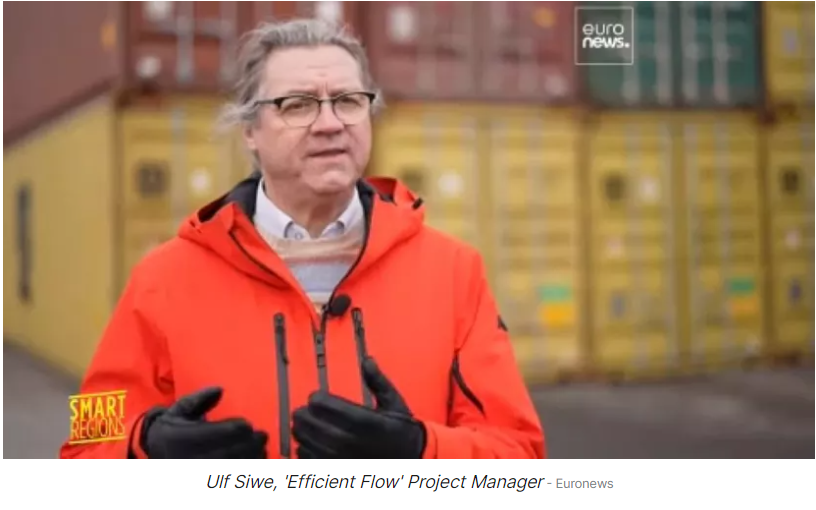Maritime transport, while indispensable for global trade, has long been a significant contributor to carbon emissions. Accounting for 3 to 4% of the EU's total CO2 emissions, or over 144 million tonnes of CO2 in 2019 alone, the sector has faced increasing pressure to transition towards more sustainable practices. However, recent initiatives within the framework of Interreg projects are showcasing promising strides towards greener maritime transport.
- 22 May 2024

The EfficientFlow Project: Revolutionizing Port Operations
In the Baltic Sea, the ports of Gävle in Sweden and Rauma in Finland have spearheaded a transformative approach to maritime traffic management. Through the EU co-financed Interreg project 'EfficientFlow,' these ports have introduced innovative systems aimed at reducing emissions and enhancing operational efficiency.
At the heart of the ‘EfficientFlow’ project lies the Port Activity App, a digital tool designed to streamline port operations by enabling real-time updates of ship schedules. This technology facilitates better coordination of port calls, ultimately reducing waiting times for vessels. The result? A significant reduction in fuel consumption and carbon emissions, estimated to reach up to 20%.
Building upon the success of the Port Activity App, the project has also inspired the development of 'Time Slot Gävle,' a queuing management system that further optimizes port operations. By allowing ships to apply for queue tickets well in advance, this system enhances the predictability of port activities, leading to even greater energy and emissions savings.
Scaling Up for Global Impact
The success of the EfficientFlow project in Gävle and Rauma has paved the way for its adoption in over a dozen other ports in Finland. With plans to extend this open-source system to ports worldwide, the project holds the potential for substantial environmental savings on a global scale. Funded primarily by the EU Cohesion Policy's Interreg Central Baltic Programme, the project exemplifies the collaborative efforts needed to drive sustainable change in maritime transport.
Hydrogen-Powered Cargo Ships: A Game-Changer in the North Sea Basin
Meanwhile, in the North Sea Basin, another EU co-financed project from the Interreg North Sea Programme, has achieved a groundbreaking milestone in green shipping. Operating primarily in Denmark and the Netherlands, this project facilitated the creation of the world's first 100% hydrogen-driven cargo ships, named H2 Barge 1 and H2 Barge 2.
These vessels represent a paradigm shift in maritime transport, as they are powered by green hydrogen, produced using electricity from renewable sources. By eliminating emissions from their operations, the H2 Barge 1 and 2 are leading the charge towards a carbon-neutral shipping industry, reducing thousands of tonnes of CO2 emissions annually.
Overcoming Challenges: From Retrofitting to Renewable Energy Integration
The journey towards greener maritime transport has not been without its challenges. Retrofitting vessels from diesel to zero emissions required advanced technological solutions, including the integration of batteries and hydrogen fuel cells. However, the real innovation lay in addressing the energy needs of these vessels with renewable sources.
Within the same Interreg project, the University of Southern Denmark undertook research to develop an intelligent harbour concept on the Danish island of Ærø. By analyzing energy demands, simulating different scenarios, and suggesting incentives to steer demand in the electric grid, the project facilitated the integration of electric ferries into the island's transport system.
Collaboration for a Sustainable Future
The success stories of the Port Activity App project and the H2 Barge project underscore the importance of collaboration in driving the green shift in shipping. By harnessing EU Cohesion Policy funds and partnering with visionary private sector companies, Interreg projects are pioneering innovative solutions that hold the key to a more sustainable future for maritime transport. As these initiatives continue to evolve and expand, they offer hope for a cleaner, greener shipping industry that benefits both the environment and global economy.
